

Imagine this scenario: you're a hardworking employee looking forward to your upcoming vacation for weeks. You've saved up your vacation days all year and finally have enough to take a two-week trip to Europe. But, right before you leave, you get sick and must take several days off to recover.
When you return to work, you realize you've used up all your sick days and still have several months left in the year. You're now worried that you won't have any more time off available if something else comes up.
This is where unlimited paid time off (PTO) comes in.
What is unlimited PTO?
Unlimited Paid Time Off is a work perk that lets you take as many days off as you need, whenever you need them, as long as you do not disrupt business. It's a flexible alternative to traditional time-off policies that limit the number of vacation, sick, and personal days you can take.
Whether you want to take a vacation, attend a family event, or simply need a mental health day, you can take the time you need without worrying about running out of days off.
“If you give employees more freedom instead of developing processes to prevent them from exercising their own judgment, they will make better decisions and it’s easier to hold them accountable.” - Reed Hastings, Co-founder and Chairman, Netflix.
Potential challenges of unlimited PTO

Doesn't unlimited PTO sound like a make-believe policy? As a matter of fact, it is (to some extent). There are quite a few challenges when it comes to implementing unlimited PTO as a policy in your company.
One of the main challenges is the risk of burnout among employees who feel guilty or hesitant to take time off, even with an unlimited PTO policy in place.
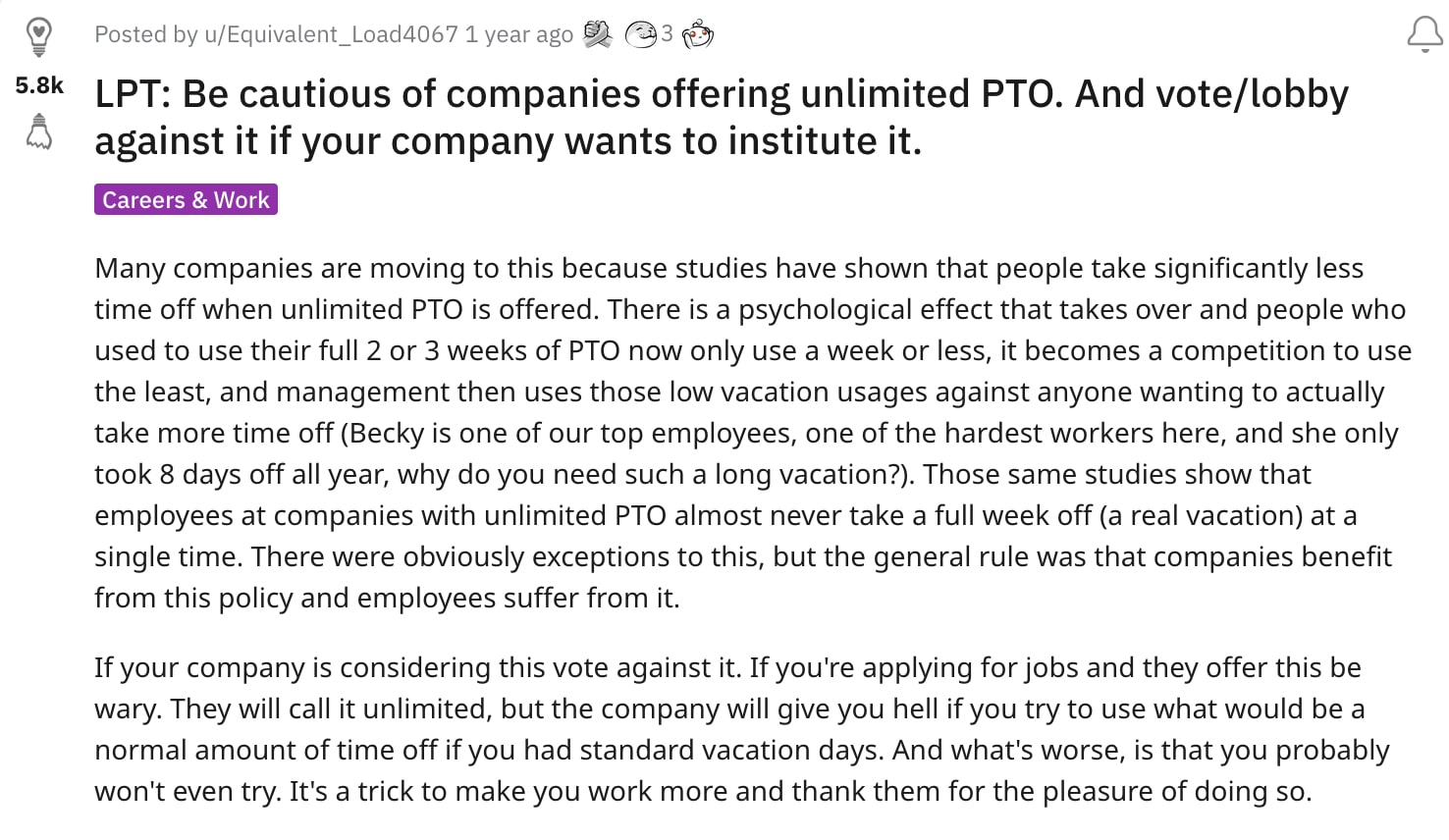
For example, this Reddit post highlights a potential downside of unlimited PTO policies where employees end up taking less time off due to the psychological effect of it becoming a competition to use the least amount of PTO. It suggests that companies benefit from this policy while employees suffer and advises job seekers to be cautious when accepting a job with such a policy.
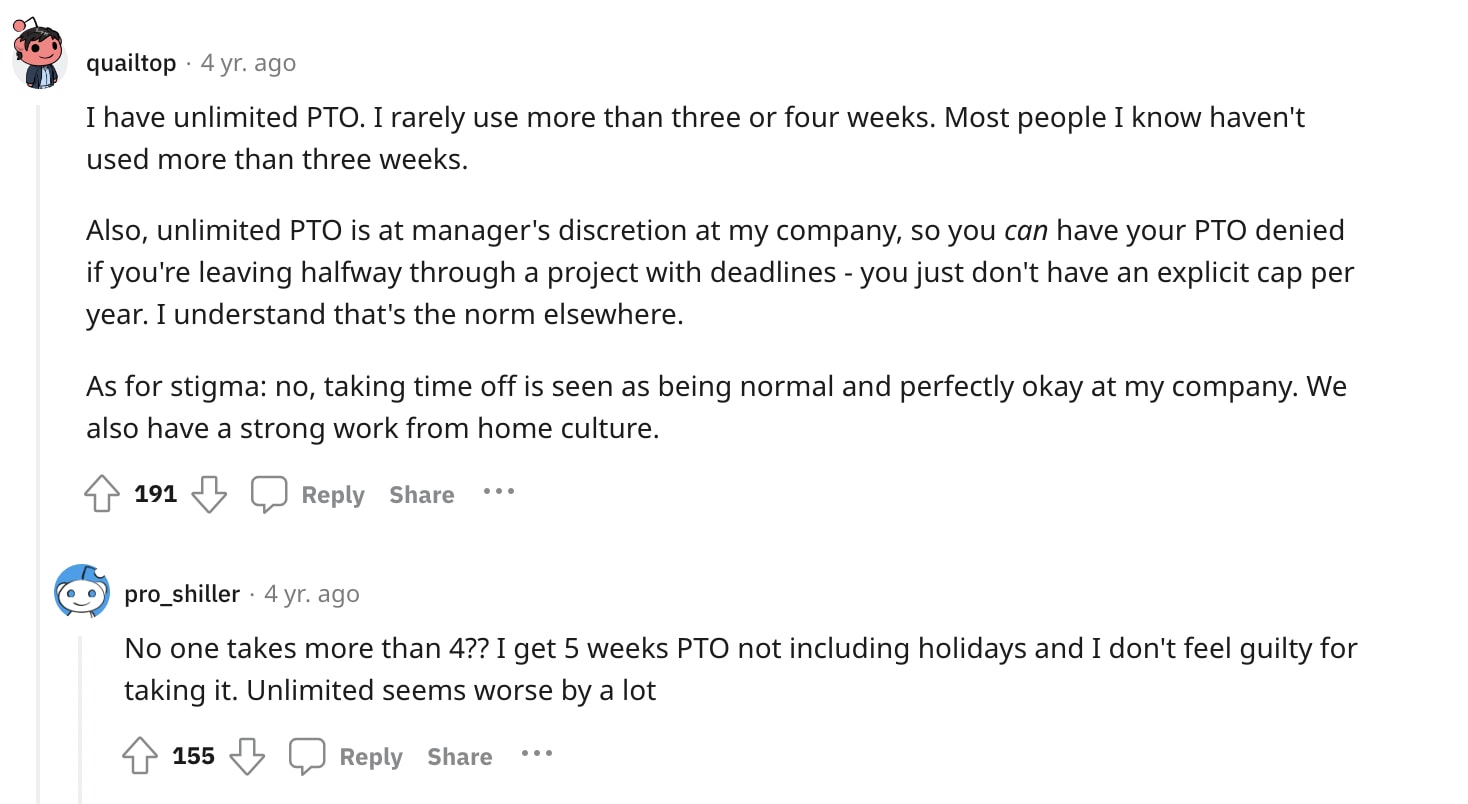
In another interaction, notice how an employee working in a company with unlimited PTO takes significantly fewer holidays than an employee working in a company offering 5 weeks of PTO.
Unlimited PTO also depends on the manager you work under. Many employees have had bitter experiences when it comes to getting PTOs due to having bad managers.
For example, a TikToker named Chloe narrates her experience in this TikTok of how she got scammed out of getting PTO in spite of informing the manager months before.
Not only is her 1 month's pre-approved PTO cut down to 2.5 weeks at the last minute, but she also loses out on getting a promotion because she requested a month-long vacation.
As you can see, it's pretty evident that unlimited PTO is not all sunshine and rainbows. It isn't easy to implement and depends a lot on the managers the employee works under.
Employers must actively encourage employees to take time off and prioritize self-care. For example, one of the possible ways:

You need to find unique ways to implement the policy, or else you risk leaving behind some disgruntled employees.
How to implement unlimited PTO?
Implementing an unlimited PTO policy is not a straightforward approach. You must get the fundamentals in place before experimenting with the policy. Here are the basic steps you must to take to implement an unlimited PTO policy:
- Assess your company's needs: Determine if an unlimited PTO policy is the right fit for your company and employees. Some jobs cannot afford an unlimited PTO policy; for example, you cannot give unlimited vacations to doctors, scientists or anyone working in time-critical jobs. Consider the needs of your employees, your company culture, and your business goals.
- Communicate the policy: Make sure all employees are aware of the new policy and understand how it works. Since unlimited PTO is a fairly new concept, you must explain what it entails and make your employees understand the policy. Hold a company-wide meeting to explain the policy and answer any questions.
- Train managers: One of the most important steps of implementing an unlimited PTO policy is to train managers. You must make managers understand the policy and show them when and how to approve PTO requests. This makes the employees' lives much easier and encourages them to take time off when required. Every employee wants a solid manager at the helm to help maintain the team's work-life balance.
- Monitor the policy: Track employee time off requests and monitor the policy to ensure that it's working effectively. Make adjustments as needed based on employee feedback and business needs. Like any new policy, you cannot expect perfect implementation immediately. Put the policy into effect and continue to monitor it. It gives you a bigger and clearer picture of how the said policy can be successfully implemented.
Companies implementing unlimited PTO
In spite of the mixed signals given by employees about their experience with unlimited PTO, the trend of implementing it has continued to grow upward. In fact, many employees prefer unlimited PTO over most other forms of PTO policies.
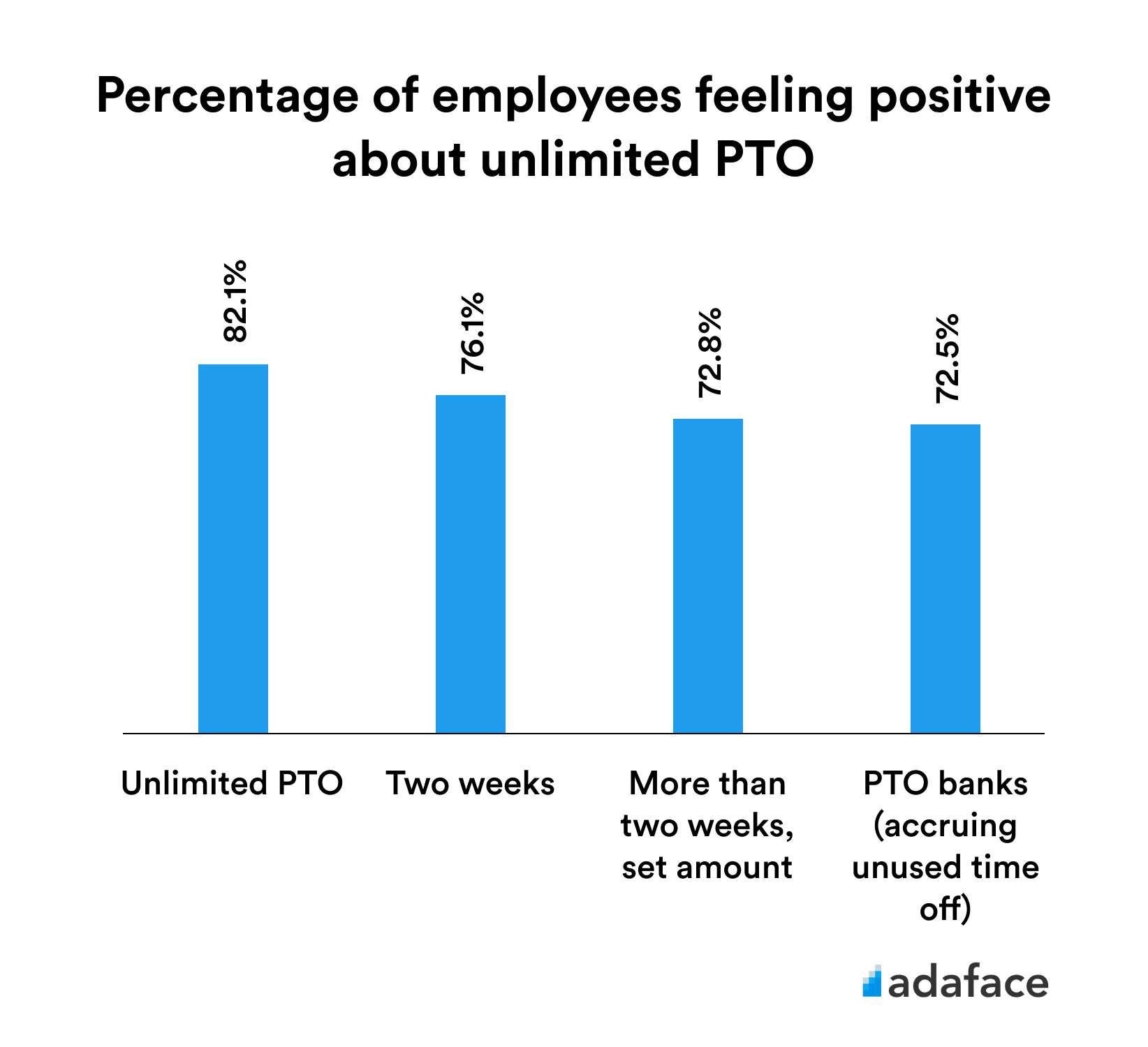
As you can see, over 80% of employees are positive about unlimited PTO being part of the benefits offered by the company.
According to an Indeed survey, US job postings with unlimited PTO rose from about 450 postings per million in May 2015 to nearly 1,300 postings per million in May 2019, up 178%.
Now, let's check out some popular companies that have implemented unlimited/flexible PTO policies.
Netflix

The policy is built on the belief that employees should be trusted to manage their own time off and that giving them the freedom to do so will result in better productivity and job satisfaction.
“We don’t have a prescribed 9-to-5 workday, so we don’t have prescribed time off policies for salaried employees, either.” — By having flexible work hours and flexible vacation days, Netflix showcases the fact that they prioritize employee wellbeing. Rather than working for an extended period, they priortize on working smarter and getting things done.
HubSpot
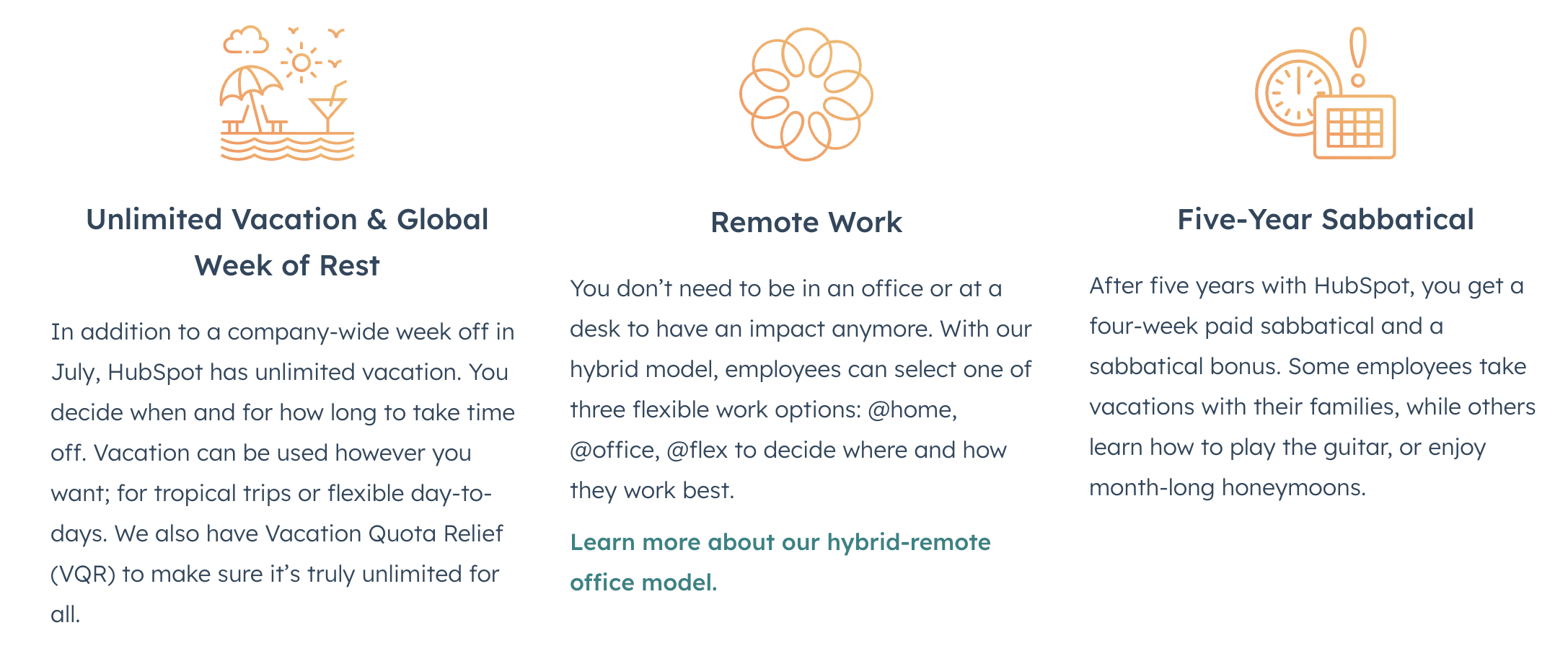
At HubSpot, employees are offered unlimited vacation time, which means they can take as much time off as they need as long as they are getting their work done and ensuring that their responsibilities are covered while they're away.
As you can see from the HubSpot benefits, they do not have fixed hours during which an employee should work. They attract top talent by showcasing the fact that they value work-life balance.
Notion

Notion, a productivity and collaboration software company, has gained a reputation for its innovative approach to time off. Instead of offering a traditional vacation policy, Notion has a flexible paid vacation policy that allows employees to take time off whenever they need it without worrying about accruing a certain number of vacation days.
Vimeo
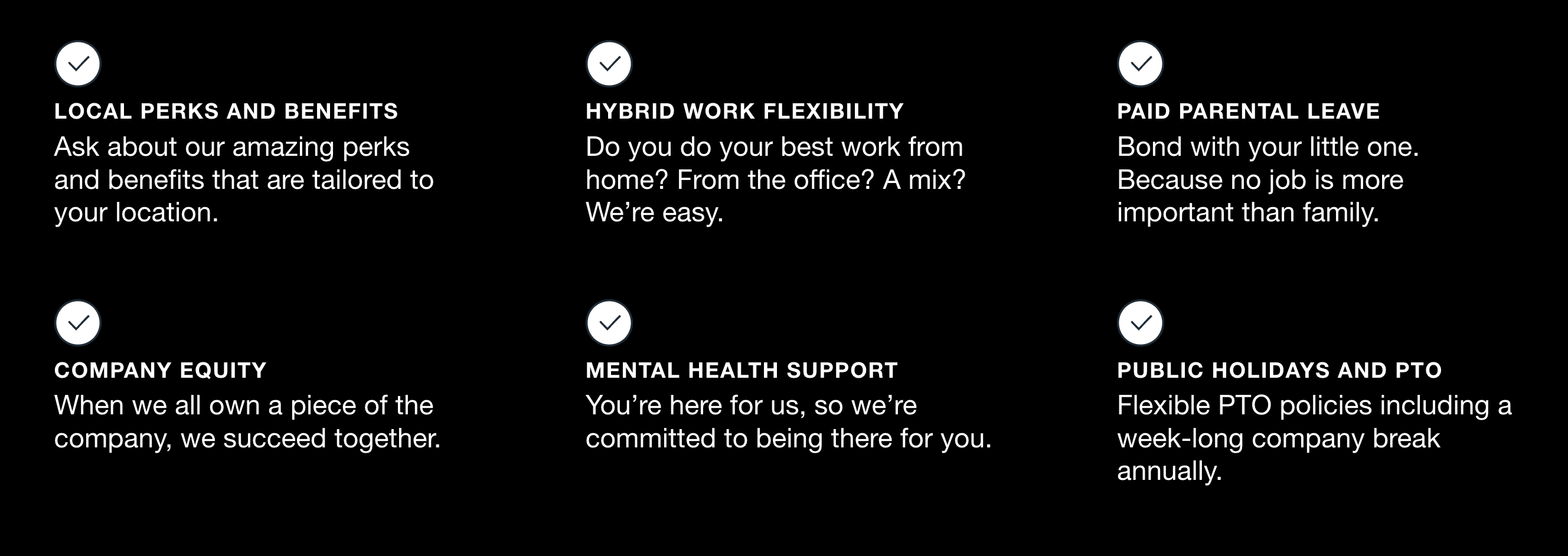
Like Notion, Vimeo implements a flexible PTO policy which involves taking time off when they need it, as long as it does not affect the work being done. The company also offers extended week-long company breaks every year.
What's the verdict?
The trend of offering unlimited PTO is gaining popularity among many companies, both big and small. As we've seen from the examples of companies like Netflix, HubSpot, and Notion, unlimited PTO can be an effective tool for promoting work-life balance, increasing employee satisfaction, and attracting and retaining top talent.
However, one must consider the major drawbacks of such a policy. We have seen how employees have claimed time and again that unlimited PTO does nothing but save money for the company and simultaneously make the employees' lives more difficult.
It's important to take the time to consider these cons to develop a clear set of guidelines and expectations for your employees. With the right approach, an unlimited PTO policy can help create a more employee-centric workplace and build a more engaged and productive workforce.
FAQs
How does unlimited PTO work?
Unlimited PTO policies allow employees to take time off as needed without a set limit on the number of days they can take off. However, employees are expected to ensure their work is covered during their absence and to comply with company policies regarding time off.
How does unlimited PTO work with company policies on sick days and personal days?
Sick days and personal days are typically separate from unlimited PTO and are handled separately.

Pragnesh is the EiR at Adaface. He loves reading books more than scrolling through social media, which is a big deal if you ask him.
Spending too much time screening candidates?
We make it easy for you to find the best candidates in your pipeline-
with a 40 min skills test.


